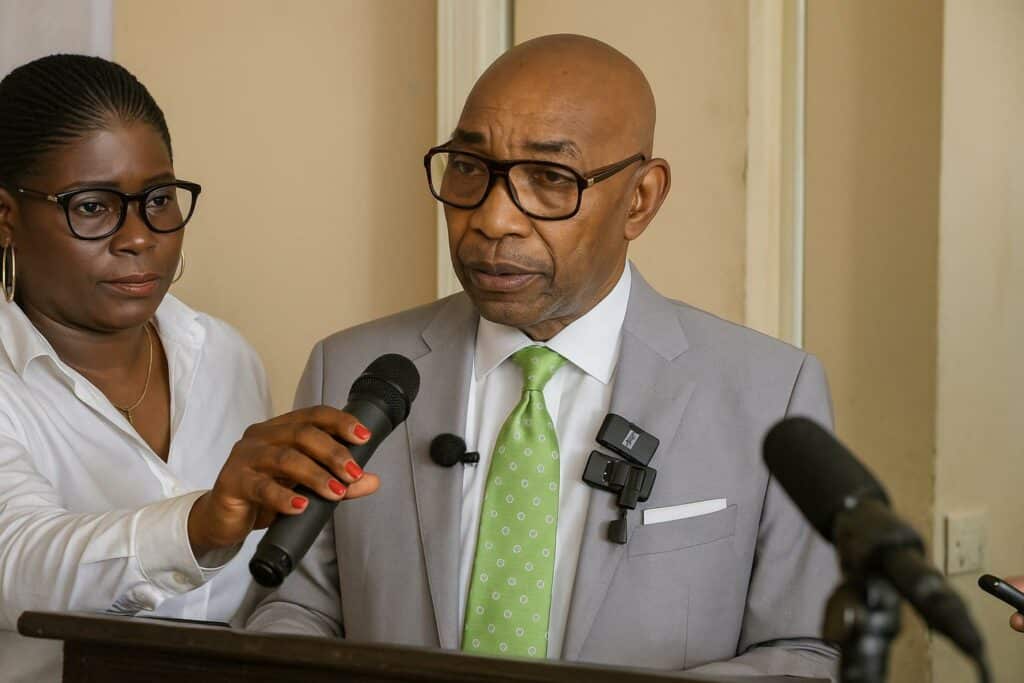A Responsible Opposition Steps onto the Stage
With measured confidence and a lexicon steeped in civic duty, Jean Bonard Moussodia on 25 October introduced the Pan-African Democratic Rally, known by its Lingala motto “Ma bâ ma nséké”, to the Congolese press in Brazzaville. The announcement marked the opening of a simultaneous structuring and membership campaign that will extend across the Republic of Congo and among its diaspora. According to party officials consulted by Les Dépêches de Brazzaville, tens of coordination committees are already identifying volunteers in Pointe-Noire, Dolisie and Paris to prepare regional conventions. The goal, Moussodia underlined, is to “restore politics to the service of the nation” by encouraging citizens who feel marginalised by partisan fragmentation to re-enter the democratic conversation.
The initiative arrives at a moment when Congo-Brazzaville, under President Denis Sassou Nguesso, has emphasised inclusive dialogue with civil society to consolidate peace and economic diversification. Government sources interviewed at the Ministry of Territorial Administration privately salute “any civic engagement carried out in respect of the constitutional order”. The RDP leadership, keen to avoid confrontation, echoes that prudence: “We prefer persuasion to protest”, Moussodia told reporters, signalling an intention to operate within institutional boundaries rather than challenge them frontally.
Toward a Founding Congress
The membership drive paves the way for a first national congress, expected before mid-2025, during which grassroots delegates will elect the permanent leadership. For Moussodia, the conclave will both symbolise and operationalise what he calls the “renaissance mandate”, a reference to the 20 December 2023 extraordinary congress of the Union of Humanist Democrats (UDH-Yuki) that he deemed “confiscated”. Political observers recall that the December meeting crystallised rival interpretations of the legacy of the late UDH-Yuki founder, Guy Brice Parfait Kolelas. By invoking that contentious episode, the RDP leader positions his new vehicle as an ethical continuation rather than a schismatic break.
Researcher Justine Mavoungou of the Central African Political Observatory notes that the congress format itself mirrors practices encouraged by the 2021 Law on Political Parties, which promotes internal democracy and transparent financing. “If the RDP implements open primaries and publishes its accounts,” she argues, “it could set a benchmark for organisational probity in the opposition space.” The party confirms that an external audit firm based in Brazzaville has been approached to certify membership figures before the congress.
A Liberal-Humanist Compass
Ideologically, the RDP aligns itself with liberal-humanism—a strand that blends market pragmatism with social solidarity and Pan-African cooperation. The platform rests on five declared pillars: ethical rupture with corrupt practices; mobilisation of national talent; democratic, humanist and Pan-African anchoring; social justice; and economic diversification. Rather than enumerate sectoral promises, Moussodia frames these pillars as a mindset: “We reject fear, we renounce resignation.”
The vocabulary resonates with Congo-Brazzaville’s current national development plan, which equally stresses diversification beyond hydrocarbons. Economic analysts at the Chamber of Commerce recognise overlaps in emphasis on agro-industry and digital services, suggesting potential areas where constructive opposition could feed into parliamentary debates without blocking executive initiatives.
The Kolelas Legacy Revisited
Though decidedly forward-looking, the RDP grounds its symbolic capital in the figure of Guy Brice Parfait Kolelas, designated “ideological guide”. Moussodia, once a close collaborator, recounts that the late leader’s message of dignity and decentralisation shaped his political conscience. He nevertheless accuses unnamed actors of having transformed UDH-Yuki into a vehicle for parochial power games, prompting his departure on 14 November 2024 together with a collective of regional coordinators.
Family representatives of the Kolelas clan contacted by our newsroom neither endorsed nor rejected the RDP initiative, noting only that “keeping the flame of democratic engagement alive honours Parfait’s memory”. Such guarded neutrality illustrates the delicacy with which political heritage is navigated in Congo-Brazzaville, where consensual discourse often tempers historical grievances.
Key Takeaways
The emergence of the RDP broadens the spectrum of legally recognised parties while reinforcing the trend toward programmatic rather than purely charismatic politics. Its leadership insists on constructive engagement with state institutions, a stance that mitigates fears of polarisation. Observers will watch whether the promised congress delivers transparent procedures and whether the party can sustain momentum beyond urban centres.
Legal and Economic Implications
Congo-Brazzaville’s 2016 Constitution guarantees freedom of association, and the 2021 Party Law requires new formations to file internal statutes, funding sources and ethical charters with the Interior Ministry. According to constitutional lawyer Clément Oba, the RDP’s public commitment to external audits could test the law’s enforcement in practice, setting a precedent for accountability.
Economically, an opposition force advocating diversification aligns with macro-fiscal objectives pursued under the government’s IMF-supported programme. Should the RDP secure parliamentary representation in future elections, it could bolster investor confidence by demonstrating cross-party consensus on key reforms.
A Measured Reconfiguration
The Pan-African Democratic Rally’s official launch signals neither rupture nor resignation but a calculated attempt to re-energise civic participation within Congo-Brazzaville’s existing institutions. By coupling liberal-humanist rhetoric with organisational promises, Jean Bonard Moussodia invites citizens to view politics not as zero-sum conflict but as shared stewardship of national destiny. The months leading to the inaugural congress will reveal whether that invitation translates into durable structure or remains an eloquent aspiration.

